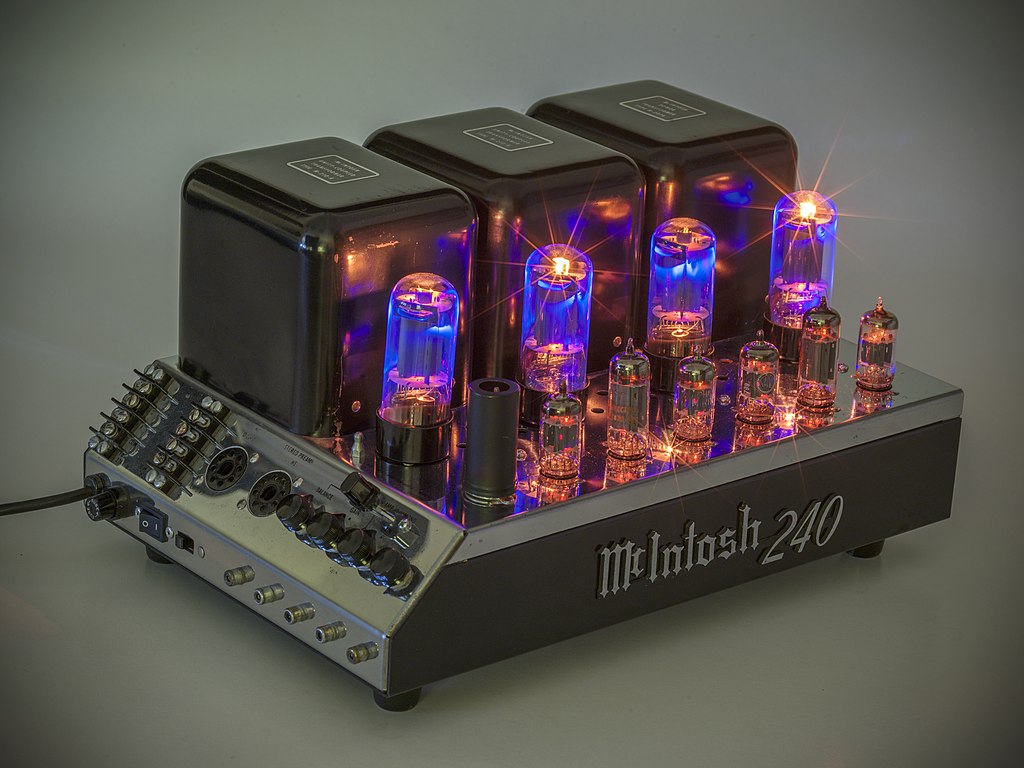Valve amps are obviously not only bought for their appearance. Their signature touch is why they are popular among purists. But rather than magic, this is completely emulatable.
The ‘no aides’ argument
When we demand hi-fi as uncoloured as possible, valve amps are totally contrary to that idea. They add harmonic distortion and more as specified below.

Just like this box does for pro audio.

An exciter (also called a harmonic exciter or aural exciter) is an audio signal processing technique used to enhance a signal by dynamic equalization, phase manipulation, harmonic synthesis of (usually) high frequency signals, and through the addition of subtle harmonic distortion. Dynamic equalization involves variation of the equalizer characteristics in the time domain as a function of the input. Due to the varying nature, noise is reduced compared to static equalizers. Harmonic synthesis involves the creation of higher order harmonics from the fundamental frequency signals present in the recording. As noise is usually more prevalent at higher frequencies, the harmonics are derived from a purer frequency band resulting in clearer highs. Exciters are also used to synthesize harmonics of low frequency signals to simulate deep bass in smaller speakers.
In other words, the effect came before or along with valve amps. But the way they are configured is also implementable into other kinds of amps. Now, since there is totally no magic and every signature is reproducible. Dsp is a wonderful thing and there is definitely a market for that among audiophiles, who would want an accessible ‘valve sound’ without spending a lot on a good valve amp and a higher energy bill.
I don’t know if Yamaha implemented this on all its digital models and for what time. But the Wxa-50 amp is one of the amps as an example of which has the exciter effect as an option aboard (and direct mode for the valve amp colouration opposer)

Yamaha calls it enhancer, another brand might call it exciter or something else. If anyone knows other brands that apply this in technique somewhere in their current line up amps, feel free to add them.
In case of Yamaha they are not advertising this, its description of what it does is kind of vague for the average user. Most likely it might stay like a vague description since the ‘no aides’ group will remain vocal and sceptical users might not like the idea.
In my opinion having affordable class D amps that can sound like a valve amp is in my opinion a great potential leap in affordable modern hi-fi. It might be or totally not be a nail in the coffin of real valve amps. Personally I think it mainly bites into the affordable valve amp market, but it all depends on how visible it will become and how it will unfold into the market.
What is your opinion on this?
(Ps credits for contributing info about the exciter effect to user DvdDoug on the audioscience forum.)
The ‘no aides’ argument
When we demand hi-fi as uncoloured as possible, valve amps are totally contrary to that idea. They add harmonic distortion and more as specified below.

Just like this box does for pro audio.

An exciter (also called a harmonic exciter or aural exciter) is an audio signal processing technique used to enhance a signal by dynamic equalization, phase manipulation, harmonic synthesis of (usually) high frequency signals, and through the addition of subtle harmonic distortion. Dynamic equalization involves variation of the equalizer characteristics in the time domain as a function of the input. Due to the varying nature, noise is reduced compared to static equalizers. Harmonic synthesis involves the creation of higher order harmonics from the fundamental frequency signals present in the recording. As noise is usually more prevalent at higher frequencies, the harmonics are derived from a purer frequency band resulting in clearer highs. Exciters are also used to synthesize harmonics of low frequency signals to simulate deep bass in smaller speakers.
Uses
- Making vocals sound more "breathy". This is why the original product was called an Aural Exciter
- Enhancing dull recordings, especially analog reel-to-reel tape recordings that have lost their "sparkle" due to repeated overdubs
In other words, the effect came before or along with valve amps. But the way they are configured is also implementable into other kinds of amps. Now, since there is totally no magic and every signature is reproducible. Dsp is a wonderful thing and there is definitely a market for that among audiophiles, who would want an accessible ‘valve sound’ without spending a lot on a good valve amp and a higher energy bill.
I don’t know if Yamaha implemented this on all its digital models and for what time. But the Wxa-50 amp is one of the amps as an example of which has the exciter effect as an option aboard (and direct mode for the valve amp colouration opposer)
Yamaha calls it enhancer, another brand might call it exciter or something else. If anyone knows other brands that apply this in technique somewhere in their current line up amps, feel free to add them.
In case of Yamaha they are not advertising this, its description of what it does is kind of vague for the average user. Most likely it might stay like a vague description since the ‘no aides’ group will remain vocal and sceptical users might not like the idea.
In my opinion having affordable class D amps that can sound like a valve amp is in my opinion a great potential leap in affordable modern hi-fi. It might be or totally not be a nail in the coffin of real valve amps. Personally I think it mainly bites into the affordable valve amp market, but it all depends on how visible it will become and how it will unfold into the market.
What is your opinion on this?
(Ps credits for contributing info about the exciter effect to user DvdDoug on the audioscience forum.)
Last edited:


